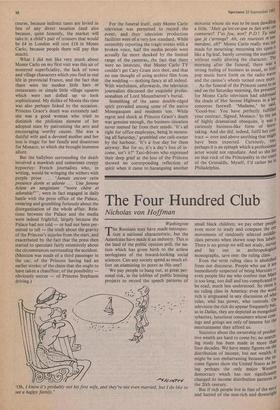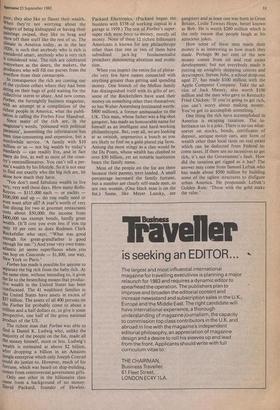The Four Hundred Club
Nicholas von Hoffman
Washington The Russians may have made introspec- tion a national characteristic, but the Americans have made it an industry. This is the land of the public opinion poll, the na- tion which has given birth to the artless neologisms of the inward-looking social sciences. Can any society spend as much ef- fort on examining its pores as this one?
We pay people to hang out, at great per- sonal risk, in the lobbies of public housing projects to record the speech patterns of
small black children; we pay other people even more to study and compare the eye movements of randomly selected middle' class persons when shown soap box labels. There is no group we will not study, surveY, and lay out in anthropological monographs, save one: the ruling class. , Even the term ruling class is abolished from our discourse. People who use it are immediately suspected of being Marxists -- even people like me who confess that Marx is too long, too dull and too complicated t,0 be read, much less understood. So there is no ruling class in America: even the word rich is attenuated in any discussion of who rules, who has power, who controls. On television the rich do appear frequently but, as in Dallas, they are depicted as mongoloid sybarites, luxurious consumers whose COar ings and goings are only of interest for the entertainment they afford us.
Statistics about the ownership of produc- tive wealth are hard to come by; no search' ing study has been made in more than four decades. We have many figures on the distribution of income, but not wealth. It
i might be too embarrassing because the in' come figures show the United States as be- ing perhaps the only major Western democracy which has not significantly changed its income distribution patterns in the 20th century. But if rich people live in fear of the envy and hatred of the non-rich and downright
Poor, they also like to flaunt their wealth. When they're not worrying about the dangers of being kidnapped or having their Paintings swiped, they like to brag and show off their stuff like the rest of us. The climate in America today, as in the late 1920s, is such that anybody who is rich is considered smart, anybody who is very rich is considered wise. The rich are celebrated everywhere as the doers, the makers, the Producers who will fill our purses from the overflow from their cornucopia. In consequence the rich are coming out of the cyclone cellars where they had been sitting on their bags of gold waiting for the collectivist storm to abate. And now comes Forbes, the fortnightly business magazine, With an attempt at a compilation of the richest people in America, what the publi- cation is calling the Forbes Four Hundred. Since many of the rich are, in the Magazine's words, 'poisoned with political Paranoia', assembling the information has been time-consuming and expensive, but a worthwhile service. 'A family with $10 Million or so — not big wealth by today's standards — can readily live, and in fact Many do live, as well as most of the coun- try's centimillionaires. You can't tell a per- son's wealth by his lifestyle. So it is not easy to find out exactly who the big rich are, let alone how much they have.
'You don't need fabulous wealth to live very, very well these days. How many Rolls- Royces — $115,000 each — or yachts $500,000 and up — do you really need or even want after all? A year's worth of very fine dining for two at gourmet restaurants costs about $50,000: the income from $400,000 tax exempt bonds, hardly great wealth. (It'll cost you even less if you tip Only 10 per cent as does Rodman Clark Rockefeller who says, "What was good enough for great-grandfather is good enough for me.") And your very own trans- atlantic jet seems superfluous when you New hop on Concorde — $1,800, one way, 'New York to Paris.'
Forbes has made it possible for anyone to separate the big rich from the baby rich. At the same time, without intending to, it gives the lie to the beseeching moans that produc- tive wealth in the United States has been confiscated. The 41 wealthiest families in the United States have assets in excess of $37 billion. The assets of all 400 persons on the Forbes list probably come to about a trillion and a half dollars or, to give it some Perspective, one half of the gross national Product of the US.
The richest man that Forbes was able to find is Daniel K. Ludwig who, unlike the Majority of the people on the list, made all the money himself, more or less. Ludwig's wealth is estimated at above $2 billion, after dropping a billion in an Amazon jungle enterprise which only Joseph Conrad could do justice to. However, much of his fortune, which was based on ship-building, comes from controversial government gifts.
Only one other in the billionaire class came from a background of no money: bavid Packard, founder of Hewlett-
Packard Electronics. (Packard began the business with $538 of working capital in a garage in 1939.) The rest of Forbes's super- super rich were born to money, mostly oil money. None of these 12 richest billionaire Americans is known for any philanthropy other than that one or two of them have
subsidised jack-leg fundamentalist preachers denouncing abortion and evolu- tion.
When you inspect the entire list of plutar- chs very few have names connected with anything greater than getting and spending money. One branch of the Mellon family has distinguished itself with its gifts of art; some of the Rockefellers have used their money on something other than themselves; so has Walter Annenberg (estimated worth: $800 million), a former ambassador to the UK. This man, whose father was a big-shot gangster, has made an honourable name for himself as an intelligent and hard-working philanthropist. But, over all, we are looking at as swinish, ungenerous a bunch as you are likely to find on a gold-plated pig farm. Among the most stingy as a clan would be the Du Ponts, whose wealth has climbed to over $30 billion, yet no notable institution bears the family name.
Most of the people on the list are there because their parents were loaded. A small percentage increased the family fortune, but a number are clearly self-made men, as are two women. (One black man is on the list.) Some, like Meyer Lansky, are gangsters and at least one was born in Great Britain, Leslie Townes Hope, better known as Bob. He is worth $280 million which is the only reason that people laugh at his atrocious jokes.
How some of these men made their money is as interesting as how much they made. Perhaps 90 per cent of the new money comes from oil and real estate development; but not everybody made it putting up unsightly shopping centres and skyscrapers. Steven Jobs, a school drop-out aged 27, has made $100 million with the Apple Computer Company. Take the ad- vice of Jack Massey, also worth $100 million and the man who gave us Kentucky Fried Chicken: 'If you're going to get rich, you can't worry about making money. You've got to accomplish something.'
One thing the rich have accomplished in America is escaping taxation. The in- heritance tax is a joke. There is no tax what- soever on stocks, bonds, Certificates of deposit, antique motor cars, any form of wealth other than local taxes on real estate which can be deducted from Federal in- come taxes. If there are no incentives to get rich, it's not the Government's fault. How did the taxation get rigged as it has? The answer may come from Samuel Lefrak who has made about $500 million by building some of the ugliest structures to disfigure urban America. He propounds Lefrak's Golden Rule: 'Those with the gold make the rules.'



































 Previous page
Previous page